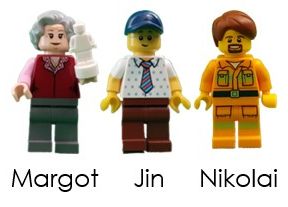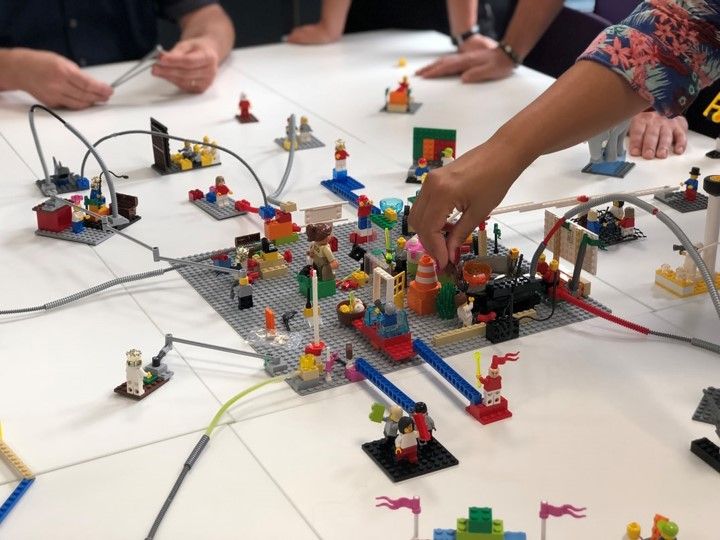Get the parachutes out. It looks like it's time for Operation Cat Drop again!
Great things are done by a series of small things brought together Vincent Van Gogh
In our last article we considered the future of work and some of the skills required for the workforce. Pearson highlighted the importance of learning strategies that includes things like setting goals, asking questions, feedback, and application of knowledge. They also stated that systems thinking was critical within organisations – something that Peter Senge wrote about and published back in the 1990’s! In his book, The Fifth Discipline, Senge introduces the learning organisation, defined as an organisation that “continually learning how to learn together”. He foresaw the need for business leaders to build and develop capacity for learning to happen reflecting on rates of change in the business landscape, a smaller world highlighting significant interdependence, and that people can always do more.

In the UK Government toolkit, recently published for Civil Servants, they describe systems thinking as “a framework for seeing the interconnections in a system and a discipline for seeing and understanding the relevant aspects of the whole system - the ‘structures’ that underlie complex situations.”
An interesting TedX talk (13 mins) by ex-US Air Force Major, Dr Steve Woodsmall, gives us a good example of how it can go wrong, particularly in the natural environment, referring to the World Health Organisation (WHO) mission in 1960, called Operation Cat Drop!
Sir Patrick Vallance, Government Chief Scientific Advisor said, “Systems thinking approaches allow us to understand the full impact of interventions across department and policy area boundaries – ultimately leading to better solutions.”
Peter Senge uses the car analogy to describe how many of us think we are operating independently. He says that when we are at the wheel we tell ourselves we are independent but in fact, the moment we are on the road, we are in a system. At this time our life depends on others and how they behave within the system. It’s only when something goes wrong when we realise the interdependencies.
Take the following simplistic examples we've experienced:
- a supermarket manager who is measured (and rewarded) based on several metrics e.g., sales, staff cost, food waste, stock availability, legal compliance and much more. A conference call with the Regional Manager is scheduled to discuss the region’s food waste numbers. The following week the Regional Manager calls the manager up thanking them for having the best food waste numbers in the Region. The next week the store still has good food waste results but as each week progresses, other metrics start to become a concern. Stock availability, particularly in the fresh food department, has got progressively worse and sales are on a downward trend. Markdowns (the % amount of reduced to clear sales) have increased. A month or so later, the compliance manager visits the store and finds trolley loads of out-of-date food still on sale – illegal and brand damaging. The manager focused only on one part, reducing food waste, forgetting the relationship and connected nature surrounding how the stock is ordered, staff stock rotation processes, the quality consumers demand, the compliance elements etc.
- the HR manager who created and implemented a wellbeing programme. It was celebrated with great fanfare and shared throughout the business. Senior leaders were heard saying ‘it will win awards’ and ‘set us apart from the competition’. Months later, engagement results, high absence, and labour turnover still highlighted stress within the workforce. If the purpose was to have a healthy and productive team, the wellbeing solution ticked many boxes, but it failed to consider the real problems within the system. Workload, how work was organised, and management were causing the problems in the first place! If the HR manager had thought 'system', they may have considered that things like management training could have had a much bigger impact than a free latte on a Wednesday!
What can you do to create the conditions for systems thinking? How could you introduce ways that encourage it?
In a previous article we introduced some of our personas that help guide people through the LEGO® SERIOUS PLAY® process. We want to introduce you to three more.

Margot, Jin, and Nikolai lead the charge in using this creative and inclusive approach to think in a system orientated way.
Margot is an architect and Jin is a town planner. Both are quite detailed and like to understand the relationships between the different LEGO® models and the real world. Working together, they support creation of great landscapes, helping participants identify all parts of the system. Placement of the models is an important part of their work as well as considering what is missing or been overlooked.
Meanwhile, Nikolai always has a selection of LEGO® connectors to hand. He enjoys what he does but, in his world, nothing ever goes in a straight line! His favourite food is Golabki, the Polish name for stuffed cabbage rolls.

Whilst Margot & Jin work hard to help create the landscape, Nikolai, as an engineer, gets more excited about how the individual models and elements connect. His focus is on identifying the system as a whole and the interdependencies and relationships that exist. Nikolai helps with effectively creating a 3D causal loop diagram which can then be analysed looking at influential parts e.g., where most connections exist, and even discussing where there is lack of connection. Always loving a bit of drama, he likes to play emergence, exploring possible events and responses, highlighting simple guiding principles to support future decision making.
LEGO® bricks are a medium and the LEGO® SERIOUS PLAY® methodology is an enabler for systems thinking, guided by Margot, Jin and Nikolai. Utilising this approach can help uncover patterns of interdependencies and predict where things could go wrong.

When was the last time something bad happened in your organisation? To what extent did you consider the interdependencies surrounding the situation?
A siloed thinking approach can be destructive. If we only ever focus on our own position, we miss what is happening in other parts of the team, function, business, and market. That insight could be game changing.
Visit www.prometheanplay.co.uk to find out more.
